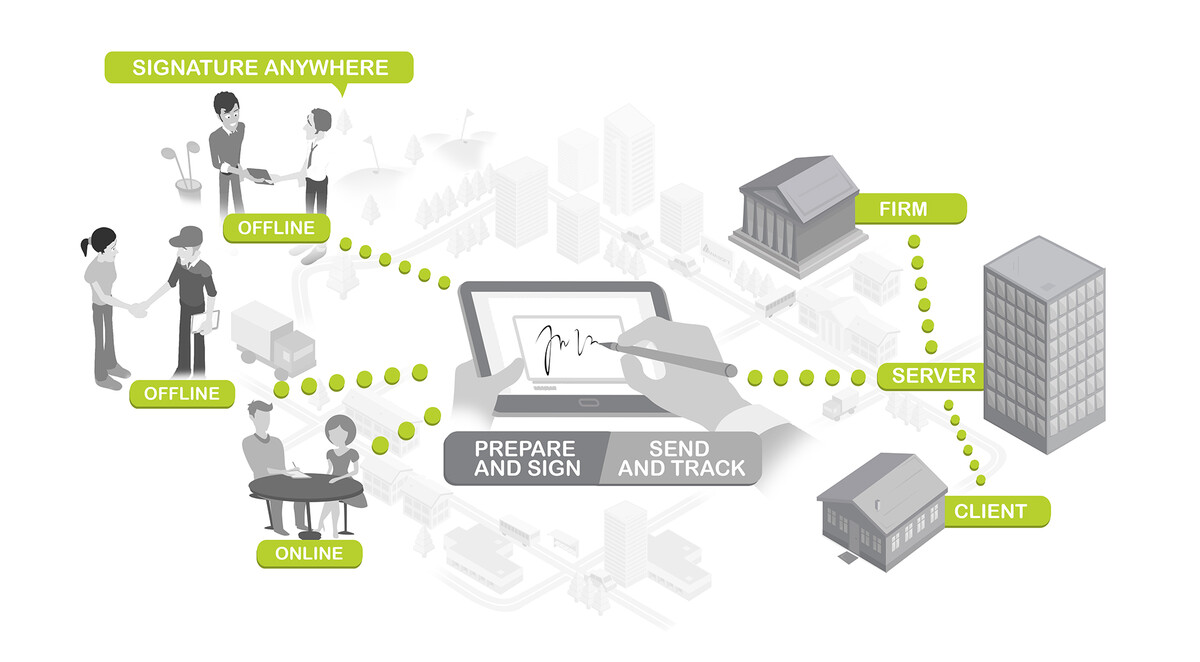E-signature is no longer only for Big Boys
2015-09-17
Tomáš Klimeš, Product Sales Manager ANASOFT
Small and medium size companies can also have their customers digitally sign contracts, handover protocols, bills of delivery and certificates of revision and service and thus expedite processes and reduce paperwork.
 Everyone who occasionally visits the branch of a bank or mobile telephone operator has signed on a small signature pad which serves for the recording of specimen signatures for concluding contracts or verifying signatures when confirming transactions.
Everyone who occasionally visits the branch of a bank or mobile telephone operator has signed on a small signature pad which serves for the recording of specimen signatures for concluding contracts or verifying signatures when confirming transactions.
Telecommunications companies and banks have even begun to consider a new concept in sales where employees with tablets walk around shops, shopping centers or the town and actively address customers, present offers and conclude contracts on the spot.
It’s only natural that large companies were the first to use digital signing technology. However, now that it is affordable and simple to use, even smaller companies are becoming interested, and not because of higher security or comfort for clients which convinced banks and mobile telephone operators to make the change. Small and medium size companies are particularly attracted by the possibility of making their processes faster and more effective.
How Does It Work
Certain models of tablets can record signatures including biometrical features with a touch pen on a screen and the software subsequently allows it to be attached to documents, such as contracts, order forms and handover protocols.
This method reminds the customers of the traditional method of signing. Everything is in front of their eyes and they can check the data. The only difference is that they don’t sign on a piece of paper but an electronic document on the tablet’s screen.
For example, a dealer in the field usually visits a customer, presents products or services and determines the customer’s needs and interests in order to send a customized offer. If the customer agrees, further steps must be taken to obtain an order or a signature on a contract. And only then can invoicing follow. This process usually takes several days, or even weeks in a worst case scenario, in the course of which the risk that the customer will reconsider or accept an offer from a competitors grows.

Faster and Safer
 Digital signatures expedite the entire acquisition process. In ideal cases, the dealer modifies the order on the tablet, adds necessary data and has the customer sign the order or contract right then and there. The signed document can be instantly forwarded to headquarters where the next processes, i.e., the issuing of invoices or the ordering of goods from a warehouse, are launched
Digital signatures expedite the entire acquisition process. In ideal cases, the dealer modifies the order on the tablet, adds necessary data and has the customer sign the order or contract right then and there. The signed document can be instantly forwarded to headquarters where the next processes, i.e., the issuing of invoices or the ordering of goods from a warehouse, are launched
Thus the entire business cycle is accelerated, cash-flow is improved and the risk that customers may change their mind or choose a competitor is eliminated. Moreover, digitizing reduces the administrative burden so dealers have more time for their customers; the error rate is also reduced since there is no need to rewrite electronic documents.
Handwritten digitized signatures can bring similar benefits for service companies such as providers of the maintenance and revision of elevators or companies that transport materials to construction sites. When handover protocols are signed by drivers and customers electronically it is impossible to have a situation as with papers where protocols are lost or destroyed and customers must be pursued all over the place.
In Compliance with Legislation
Suitable software can save signed documents in tablets or even synchronize then simultaneously with remote servers. As a result, the signed documents are safe and if the handover of goods requires invoicing, that process can start instantly, which improves the cash-flow. If documents are signed by software that is compatible with legislation and graphologists know how to work with it, they are as valid as hard copies.
Naturally, it doesn’t make sense to introduce digital signing in companies with an annual output of two or three projects or which were established for a specific purpose for one or two jobs. But traditional companies, companies providing services or transport have the same priorities – to conclude a contract, supply goods or provide services and issue invoices as fast as possible. They don’t want to deal with unnecessary administrative burdens, print dozens of pages of documents , archive mountains of paper, send mail or waste time by constantly visiting customers with contracts or orders. Handwritten digitized signatures will improve the quality of their lives.







